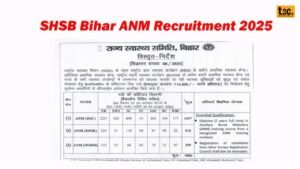How to Join ISRO? What to Study, Which Fields to Choose, and Where to Learn!

The Indian Space Research Organisation (ISRO) is a premier space agency that has been at the forefront of India’s space exploration journey. Joining ISRO is a dream for many students and professionals in the field of science and technology. However, the path to becoming a part of this esteemed organisation requires careful planning, dedication, and hard work.
If you’re aspiring to join ISRO, it’s essential to understand the requirements, eligibility criteria, and the right educational background to pursue a career in space science and technology. This blog post will guide you through the process of joining ISRO, including what to study, which fields to choose, and where to learn, to help you achieve your goal and take the first step towards a rewarding career in space research and exploration.
What to Study to Join ISRO?
To join ISRO, you need to have a strong foundation in science and technology. Here are the essential subjects and degrees to pursue:
- Physics, Chemistry, and Mathematics (PCM): These subjects are crucial for most technical and research roles at ISRO.
- Bachelor’s Degree: A bachelor’s degree in fields like Mechanical, Electronics and Communication, Electrical, Computer Science, or Aerospace Engineering is required for most technical positions.
- Master’s and Doctoral Studies: For advanced research or specialised positions, a Master’s or PhD in relevant fields like space science, astrophysics, computer science, or satellite technology is beneficial.
Before proceeding further, take a look at: US Student Visa Season Off to a Slow Start for Indians Amid Trump Crackdown!

Which Fields to Choose to Join ISRO?
ISRO’s work covers a range of scientific and engineering domains. Some key fields to consider include:
- Mechanical Engineering: Design and development of launch vehicles and spacecraft structures.
- Electronics and Communication Engineering: Satellite systems, instrumentation, and communication technologies.
- Computer Science: Software development, data analysis, and mission control systems.
- Aerospace Engineering: Propulsion, aerodynamics, and spacecraft systems.
- Physics, Mathematics, and Astronomy: Research in space science, astrophysics, and planetary studies.
Where to Learn to Join ISRO?
Some top destinations to learn and become eligible for ISRO include:
- Indian Institutes of Technology (IITs): Known for offering programs in engineering and science disciplines relevant to ISRO.
- National Institutes of Technology (NITs): Offer programs in engineering and science disciplines relevant to ISRO.
- Indian Institute of Space Science and Technology (IIST): Directly supported by ISRO, IIST offers undergraduate, postgraduate, and doctoral programs in space science and technology.
- Indian Institute of Science (IISc): Offers programs in science and engineering disciplines relevant to ISRO.
Do not miss out on reading on: Assam NEET UG 2025 Provisional Merit List Released: Check Direct Link to Download Here!
ISRO Recruitment Process to Join ISRO
ISRO’s main recruitment for technical roles is through the ISRO Centralised Recruitment Board (ICRB) exam. The process involves:
- Written Test: Focused on core technical concepts relevant to the candidate’s discipline.
- Interview Round: For shortlisted candidates, assessing practical and domain knowledge.
- GATE Scores: Some research and fellowship positions may consider GATE scores.
Eligibility Criteria to Join ISRO
To be eligible for ISRO recruitment, you’ll need to meet the following criteria:
- Indian Citizenship: You must be an Indian citizen.
- Educational Qualifications: You must have the required educational qualifications, such as a bachelor’s degree in a relevant field.
- Age Limit: There’s an upper age limit of 28 years for the general category, with relaxations for reserved categories.

Cast your eyes on: NMC Restores Eligibility of MSc and PhD Holders to Faculty Positions in Medical Colleges!
Tips for Joining ISRO
- Stay Updated: Keep yourself updated with the latest developments in the field of space science and technology.
- Gain Practical Experience: Participate in internships, projects, and research programs to gain practical experience.
- Network: Network with professionals in the field of space science and technology to learn about new opportunities and developments.
Conclusion
Joining ISRO requires a strong foundation in science and technology, as well as a passion for space research and exploration. By pursuing the right subjects and degrees, gaining practical experience, and staying updated with the latest developments, you can increase your chances of becoming a part of this prestigious organization.
Stay tuned on our website, as if any official information pops up then we will update you in minutes! If you want all the latest updates on time, then join our student community on WhatsApp!
Choose the right career yourself by booking personal guidance from professionals on Mytagapp.com







